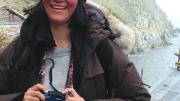“We ended up going by crab tender,” says Joan Naviyuk Kane ’00, of her latest work trip. “It’s not lavish, or glamorous, riding a crab tender out, 90 miles, 12 hours across the Bering Sea.”
Kane’s choice of transportation—a small boat used alongside larger vessels in crabbing—is perhaps even more surprising given her choice of career. The former English concentrator has three books of poetry to her name: The Cormorant Hunter’s Wife, Hyperboreal, and an untitled collection just sent to her publisher. “I thought I was going to be pre-med,” she says, but a gap year after high school and a fall semester in Porter University Professor Helen Vendler’s freshman seminar, reading poetry closely, changed all that. Today, she lives with her young family in her hometown, Anchorage, teaches at the Institute of American Indian Arts via Skype, and works on poems, plays, and her first novel. “I am drawn to the knots and burls of language,” she says. “Its possibilities, elisions, and limits.”
But back to the Bering Sea. The crab tender was headed to King Island, a tiny, rocky landmass between Russia and Alaska. Now uninhabited, the island was home until the early 1960s to a small indigenous hunting and fishing community that included Kane’s mother and grandparents. Eventually, under the Bureau of Indian Affairs’ assimilation policy, they were pressured to leave.
Though Kane was born after they left the island, she describes a childhood filled with stories of its landscape, with “cliffs at 45-degree angles, rising straight up out of the sea.” The island, and the Inupiaq language, culture, and history so deeply tied to it, have shaped her life and writing. So this past summer, after a successful crowd-funding campaign, she and a small group of fellow King Island women returned. It was the first time she had set foot there.
“It’s one thing to hear; it was another thing entirely to go,” she says of the trip’s hazards. She had hoped to take her mother and young sons, but conditions on the island and the reality of arctic sea travel prevented that.
Apart from her years at college and at Columbia, earning an M.F.A., Kane has spent her entire life in Alaska. A writer’s life is often said to be solitary, but Kane clearly feels tremendous loyalty to her family, to the King Island community, and to the American indigenous community at large. Her poetry deals with themes of displacement, loss, reclamation, modernity, and extinction, and makes use not only of King Island traditions but also of its language. Though not fully bilingual, she describes Inupiaq as “essential to my engagement with language as a literary artist.” Her translations, she says, “are informed by my rudimentary ability to translate between the written Inupiaq language and English with accuracy. I rely on fluent speakers to help me.”
She mentors other writers as a teacher, and believes passionately in collaboration and connection among indigenous writers and artists. She and peers hope to organize a multiday retreat where Native poets can “workshop poems, have a discussion with each other about native poetics, and have a discussion about this vision of beginning to populate our country, our native land, with our stories and our voices.” Her trip, she says, reminded her “that it is so important for Native writers, for Native people, to contextualize our work and the complexity of our identities as people as much as possible. Not in any mawkish or maudlin or superficial way, but to consider what it means to write in the traditions of the English language, of a colonizing language, and in the traditions of a dominant culture.”
Soon her time on King Island will make its way into her writing. “I think I’m ready to begin in the next couple of months,” she says, “and really make sense of how hard it is to go back to a place that was left—that people emigrated or migrated from—and of this idea of returning.”








